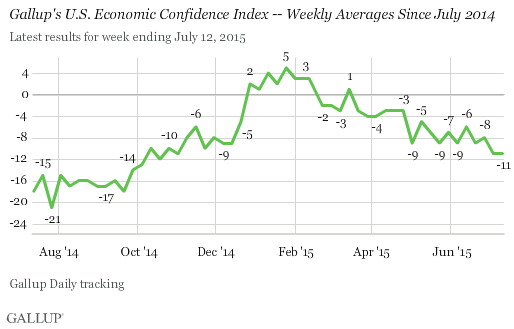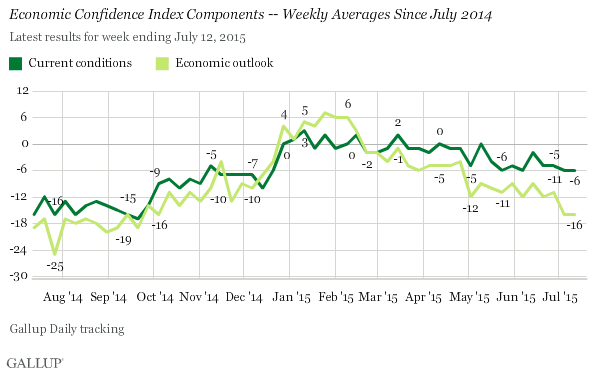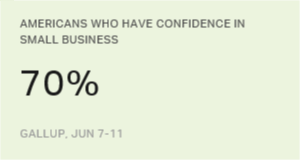Story Highlights
- Last week's index score tied for lowest since October 2014
- Three in 10 Americans describe economy as poor
- More than half say economy is "getting worse"
WASHINGTON, D.C. -- Gallup's U.S. Economic Confidence Index registered at -11 for the week ending July 12. This matches the previous week's score, which marked an eight-month low for the index.

The weekly index made significant gains in the latter half of 2014, coincident with the decline in gas prices, and peaked in January at +5. Since then, scores have generally declined, with the latest figures representing the index's lowest since late October.
Gallup's Economic Confidence Index is the average of two components: how Americans view the current economy and whether they feel the economy is improving or getting worse. The index has a theoretical maximum of +100, if all Americans rate the economy as excellent or good and improving; and a theoretical minimum of -100, if all Americans rate the economy as poor and getting worse.
For the week ending July 12, 25% of Americans said the economy is "excellent" or "good," while 31% said it is "poor." This resulted in a current conditions score of -6, the same as the prior week. The economic outlook score was also unchanged, at -16, the result of 40% of Americans saying the economy is "getting better," while 56% said it is "getting worse."

Bottom Line
Much has occurred over the past week to leave Americans' confidence in the economy depressed. On Wednesday, a technical glitch suspended trading on the New York Stock Exchange for hours, on a day marked by significant stock losses. Meanwhile, abroad, Greece gathered a lot of attention, with the country's potential exit from the eurozone possibly having economic ramifications in Europe, the U.S. and elsewhere.
These double-pronged threats to the U.S. economy, however, have been neutralized. With the New York Stock Exchange humming as usual and a newly agreed-upon rescue program for the nearly bankrupt Greece, Americans' confidence could likely improve by next week.
However, confidence had been trending downward even before the stock market glitch and the Greek referendum on austerity, so the recent good news may help confidence only to a limited extent. But with gas prices still relatively low, a rebound in economic confidence is not entirely out of the question.
These data are available in Gallup Analytics.
Survey Methods
Results for this Gallup poll are based on telephone interviews conducted July 6-12, 2015, on the Gallup U.S. Daily survey, with a random sample of 3,533 adults, aged 18 and older, living in all 50 U.S. states and the District of Columbia. For results based on the total sample of national adults, the margin of sampling error is ±2 percentage points at the 95% confidence level. All reported margins of sampling error include computed design effects for weighting.
Each sample of national adults includes a minimum quota of 50% cellphone respondents and 50% landline respondents, with additional minimum quotas by time zone within region. Landline and cellular telephone numbers are selected using random-digit-dial methods.
Learn more about how Gallup Daily tracking works.

